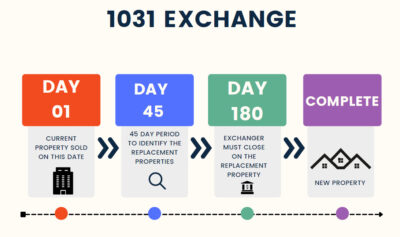Investing in real estate can be a lucrative endeavor, but navigating the intricacies of tax regulations can often be overwhelming. One powerful tool that real estate investors can utilize to their advantage is the 1031 exchange. This provision of the Internal Revenue Code allows investors to defer capital gains taxes when they exchange one investment property for another of equal or greater value. If you’re a real estate investor in North Carolina, understanding the specific rules and regulations that apply to 1031 exchanges is crucial. This comprehensive guide will walk you through the key aspects of 1031 exchange rules in North Carolina.

- Eligibility Criteria: To qualify for a 1031 exchange in North Carolina, the properties involved must be held for investment or business purposes. Personal-use properties, such as primary residences or vacation homes, do not qualify. Both the relinquished property (the property you’re selling) and the replacement property (the property you’re acquiring) must be located within the United States.
- Like-Kind Property Requirement: The term “like-kind” can be misleading. In the context of 1031 exchanges, it refers to the nature and character of the investment properties, not their exact use. This means you can exchange a residential property for a commercial property or vacant land for a rental property, as long as they’re held for investment purposes.
- Timeline: There are strict timelines associated with 1031 exchanges. Once you sell your relinquished property, you have 45 days to identify potential replacement properties. You must close on one or more of these identified properties within 180 days from the sale of the relinquished property. It’s important to adhere to these deadlines, as failure to do so could disqualify the exchange.
- Qualified Intermediary (QI): To facilitate a 1031 exchange, you’re required to work with a qualified intermediary, also known as an accommodator or QI. The QI plays a crucial role in facilitating the transaction and ensuring that the funds from the sale of the relinquished property are not received directly by you, as this would trigger a taxable event.
- Reinvestment Requirement: To defer all capital gains taxes, you must reinvest the entire net proceeds from the sale of the relinquished property into the replacement property. If you receive any cash or other non-like-kind property as part of the exchange, you’ll be taxed on that amount.
- Equal or Greater Value: The replacement property must be of equal or greater value than the relinquished property. Additionally, any debt on the replacement property must be equal to or greater than the debt on the relinquished property. If you don’t fulfill these criteria, you might incur partial taxation on the capital gains.
- North Carolina State Tax Considerations: While 1031 exchanges are recognized at the federal level, North Carolina imposes its own state capital gains taxes. It’s crucial to consult with a tax professional who is well-versed in North Carolina state tax laws to understand the implications of state taxes on your 1031 exchange.
The 1031 exchange is a powerful tool for real estate investors in North Carolina to defer capital gains taxes and potentially grow their investment portfolios. However, the rules and timelines associated with 1031 exchanges can be complex, and even a small mistake could lead to unintended tax consequences. It’s highly recommended to work closely with experienced professionals, including real estate brokers, tax advisors, and qualified intermediaries, to ensure a smooth and successful exchange process while complying with North Carolina’s specific regulations. Always remember that tax laws can change, so staying up to date with the latest information is crucial for making informed investment decisions.
Are you interested in selling your investment property and doing a 1031 exchange? We can help! Visit the link below to learn more about selling your property with Cottage Real Estate.

